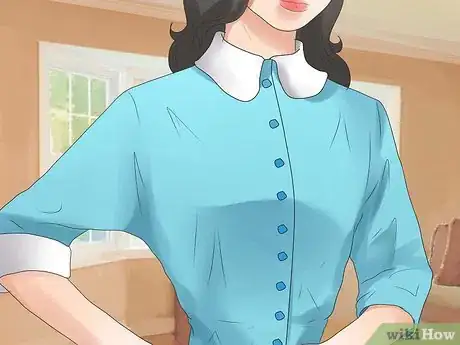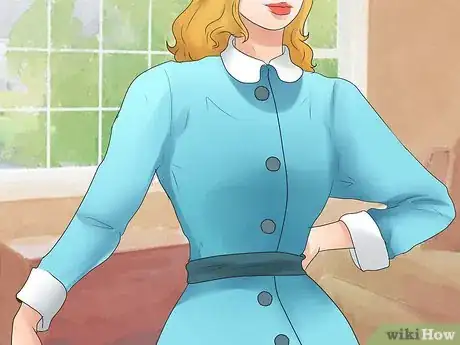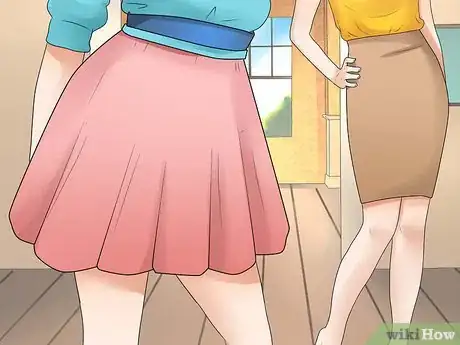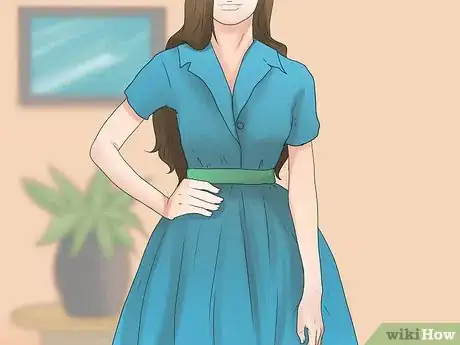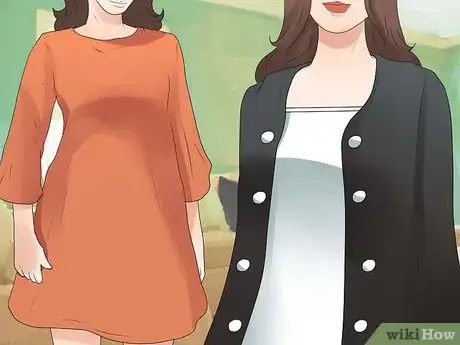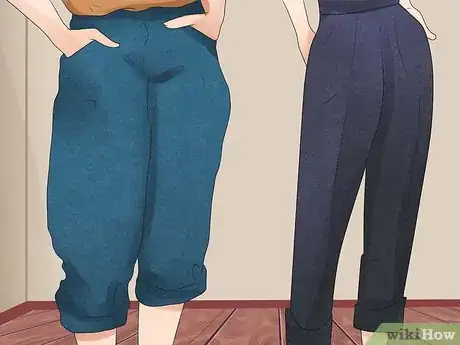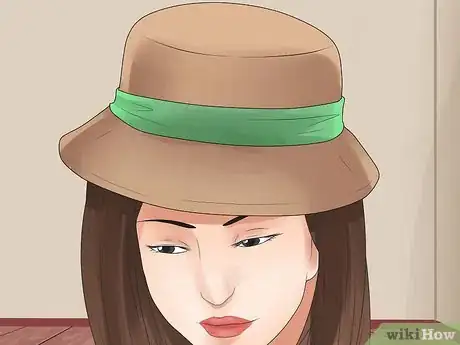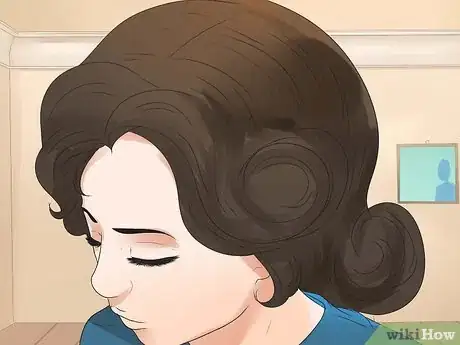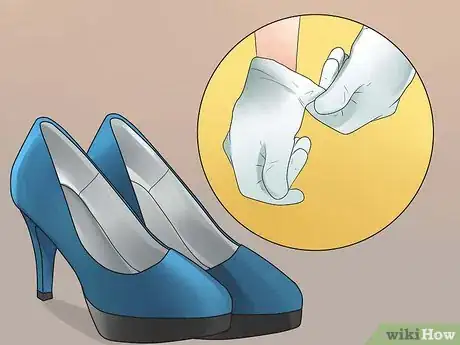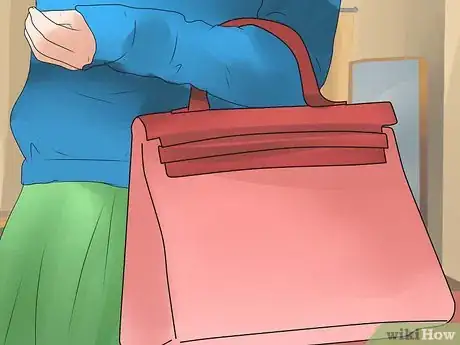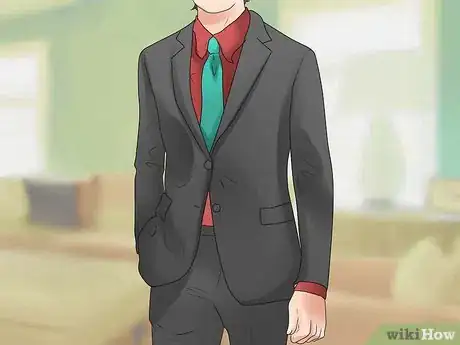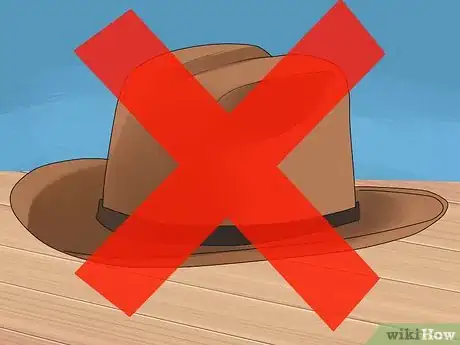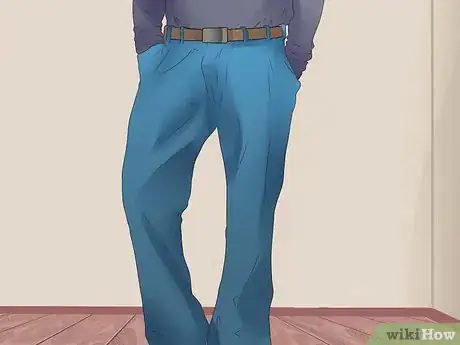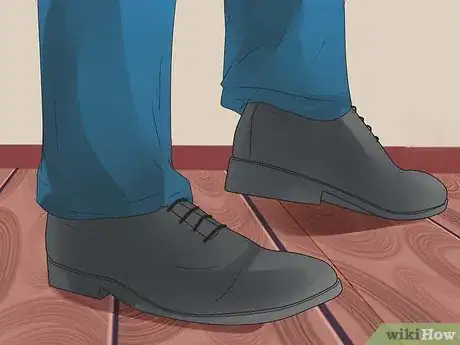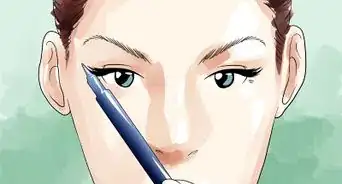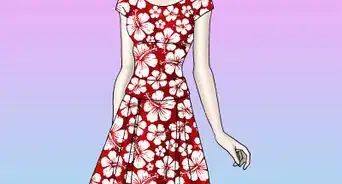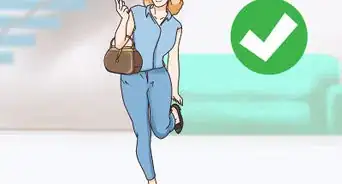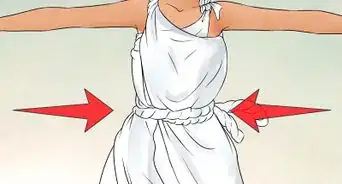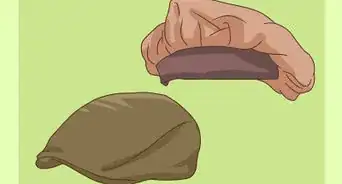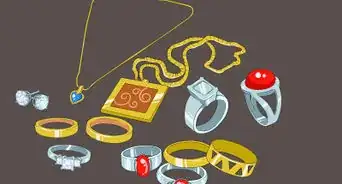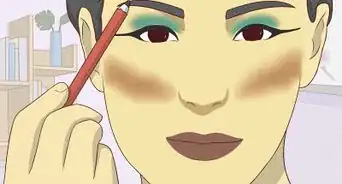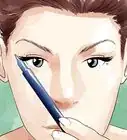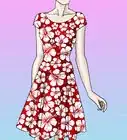This article was co-authored by Katie Quinn. Katie Quinn is an Image Consultant, Personal Wardrobe Stylist and the Founder of Q the Stylist, an image consulting service based in New York City helping men and women understand their specific goals, improve their wardrobe, performance, and life. She has over 11 years of image consulting experience and has worked as a stylist for Trunk Club, Modewalk, and Moda Operandi. Her work has been featured in Vogue, InStyle, Martha Stewart Weddings, Sheridan Road, Slate, Newsy, Rue, and Thrillist.
There are 10 references cited in this article, which can be found at the bottom of the page.
wikiHow marks an article as reader-approved once it receives enough positive feedback. In this case, 92% of readers who voted found the article helpful, earning it our reader-approved status.
This article has been viewed 866,038 times.
After World War II, there were some major fashion changes.[1] The 1940s silhouette had wide shoulders and a short skirt, but the 1950s styles were hourglass in shape (a fitted body with small shoulders, a small waistline, a full skirt and higher heels). Though the styles changed pretty drastically from the beginning of the decade to the end of the decade, there were quite a few fashion staples that were constant throughout. If you're interested in dressing in a '50s style, here are some things to consider.
Steps
Knowing the Styles for Women
-
1Find a fitted blouse. Quarter length sleeves were popular during this time period. The shoulders were fitted rather than puffy. However, sleeveless blouses were also popular. Small collars close to the neckline, called Peter Pan collars, were typically round in shape.
-
2Look for jackets that are very fitted, with more rounded shoulders. This type of clothing was hemmed at the hip level to emphasize a woman's small waist. Collars on jackets were often small and rounded in the Peter Pan style, just like on the blouses. There were many types of decorative pockets and big buttons on jackets in the 1950s.[2]
- You might also wear a fitted cardigan with pearl buttons.[3]
Advertisement -
3Choose the type of skirt. There were several different types of skirts that were popular in the 1950s. Styles often featured nipped-in waists and full skirts.[4] Here are some of the most common styles:
- Full skirts. These had more fabric, often with layered petticoats to make it more full. The material could be sewn in many different ways including circle, gathered, pleated or gored.
- Pencil skirts. These skirts were narrow and straight.[5] The skirts were designed to emphasize the woman's slim waistline, which was a very important factor in the 1950s
- Swing skirts. These were knee high skirts that were also called poodle skirts. However, poodles were not the only animal featured on swing skirts. Nearly any animal, insect, or flower could be depicted on this kind of skirt.
-
4Try a shirt dress. Shirt dresses were very popular. These had a shirt-like bodice, with no gathered/exaggerated waistline. A narrow belt was often worn with this kind of dress.
-
5Realize that further into the decade, styles changed. Here is a run down of silhouette styles after 1955:
- The A-line look (narrow shoulder to wide hem) was very popular.
- Looser fitting dresses were also seen mid-decade.
- Sac (or Sack) dresses became common; these were loose and baggy.
- At this time, the hemline for most skirts and dresses was near the knee.
- Jackets became boxy and the Chanel look (a type of woman's suit) was worn. This look had contrast trim around the jacket edges, no collar, and small pockets with contrast buttons.
-
6Get the right type of pants/trousers. There were several different styles of pants popular for women in the 1950s. Pant legs became narrow during the '50s. Pants were very popular and worn at home and for leisure.
- The capri was mid-calf length; the peddle pusher was a long short; Bermuda shorts were knee-length. These were worn with flat shoes, ballet-type flats, and simple sneakers (like Keds). Socks were optional.
-
7Wear a hat! Small hats worn close to the head were popular during the early 1950s[6] , but during the latter years flower pot hats were seen. These kinds of hats were worn higher on the head and were bigger in shape.
-
8Know the hairstyles for women. Early in the '50s hairstyles were short and close, much like Audrey Hepburn's style, with short bangs in the front and short, flat layers on the sides and back.
- Later, women's hairstyles became larger and bouffant, in the fashion of Elizabeth Taylor.[7] This style was often worn shoulder-length with buoyant roll curls in the front that continue into the sides of the hair in the wavy pageboy style.
-
9Invest in some period appropriate shoes and gloves. Gloves of all colors were worn with dresses. Longer (above the elbow) gloves were worn at night with bracelets for a more formal look, while shorter (wrist length) gloves were worn in the daytime.[8] Shoes often had pointed toes and thin kitten heels.
-
10Carry a handbag. In the 1950s, handbags grew smaller, often envelope in shape. The "Kelley" bag was a simple hand bag with handle. Wicker and gold lame were popular handbag material.[9]
- Most handbags had shorter handles (no long straps).
Knowing the Styles for Men
-
1Wear a fitted suit. During this time, suits were becoming more narrow - with slim "cigarette leg" pants and a sack coat shape (like a Brooks Brother's suit). Charcoal grey was a popular color for men's suits.[10] Note: a white shirt was usually worn with this grey suit, along with a plain, narrow tie.
-
2Ditch the hat. Before the war, all men wore hats. But moving into the '50s, hats became less and less popular. Why? Because men were driving more and hats were bothersome to wear while in the car.
-
3Pay attention to the trends for shirts. For men, there were many situational fashions that were worn at certain times by certain types of people.
- Khaki and plaid shirts or button-down collared oxford cloth shirts were seen on students. T-shirts were seldom worn alone because they were considered an undershirt. Hawaiian shirts and box shirts were worn in the summer.
-
4Know what pants were in fashion. Slim-legged cigarette pants were a popular men's style during this time period. Jeans were typically used for outdoor wear, but many teenagers wore them more regularly. Bermuda shorts were often worn in the summer.
-
5Find the right shoes. In the 1950s, most men wore Oxford shoes (often two-toned), saddle shoes[11] , or chukka boots. Saddle shoes are two toned (usually black and white) leather shoes with a flat heel, and they were very popular during that time.[12] Chukka boots are ankle-high leather boots that typically only have 2-3 pairs of holes for lacing the shoelace.
-
6Know the hairstyles for men. Hair was worn short, in a post-military style. Men started to wear their hair longer at the end of the decade, but it was still groomed to stay off the ears.[13]
- Some men also went for the longer, greased pompadour. Elvis Presley made this hairstyle famous in the 1950s.
Expert Q&A
-
QuestionWhat are the defining characteristics of American 1950s fashion for women?
 Katie QuinnKatie Quinn is an Image Consultant, Personal Wardrobe Stylist and the Founder of Q the Stylist, an image consulting service based in New York City helping men and women understand their specific goals, improve their wardrobe, performance, and life. She has over 11 years of image consulting experience and has worked as a stylist for Trunk Club, Modewalk, and Moda Operandi. Her work has been featured in Vogue, InStyle, Martha Stewart Weddings, Sheridan Road, Slate, Newsy, Rue, and Thrillist.
Katie QuinnKatie Quinn is an Image Consultant, Personal Wardrobe Stylist and the Founder of Q the Stylist, an image consulting service based in New York City helping men and women understand their specific goals, improve their wardrobe, performance, and life. She has over 11 years of image consulting experience and has worked as a stylist for Trunk Club, Modewalk, and Moda Operandi. Her work has been featured in Vogue, InStyle, Martha Stewart Weddings, Sheridan Road, Slate, Newsy, Rue, and Thrillist.
Image Consultant Some things that come to mind are nipped-in waists, full skirts, Peter Pan collars, fitted cardigans with pearl buttons, and saddle shoes.
Some things that come to mind are nipped-in waists, full skirts, Peter Pan collars, fitted cardigans with pearl buttons, and saddle shoes. -
QuestionHow were scarves used in the 1950s?
 Community AnswerScarves were used in a versatile way, such as belts, to tie pony tails, and worn around the neck. Today, the most identifiable way of how scarves were worn in the '50s was on the head as a bandanna.
Community AnswerScarves were used in a versatile way, such as belts, to tie pony tails, and worn around the neck. Today, the most identifiable way of how scarves were worn in the '50s was on the head as a bandanna. -
QuestionDid women wear jewelry in the 50s?
 Community AnswerPeople have been wearing jewelry since prehistoric times. During the 50s, your typical casual jewelry would be minimalistic in nature. Pearls, tennis bracelets, stud earrings, small chain necklaces - with or without a small pendant. Depending on class, taste, and financial ability, there was quite a variety of jewelry styles.
Community AnswerPeople have been wearing jewelry since prehistoric times. During the 50s, your typical casual jewelry would be minimalistic in nature. Pearls, tennis bracelets, stud earrings, small chain necklaces - with or without a small pendant. Depending on class, taste, and financial ability, there was quite a variety of jewelry styles.
Things You'll Need
A Quick Rundown of 1950s Clothing
It may be hard to walk into a clothing store and ask for 1950s inspired clothing. You won't find a dedicated section in too many stores for these accouterments, so you'll need to do a little hunting. Here's what women should look for:
- Knee-length skirts
- Floral fabric
- Fitted tops and full skirts
- Full-length ball gowns
- Tight pants
- Kitten heels
- Any dress that gives you an hour-glass silhouette
Here's what men should look for:
- Fitted suits
- Hawaiian shirts
- Oxford shoes
- Bermuda shorts
References
- ↑ http://www.retrowaste.com/1950s/fashion-in-the-1950s/
- ↑ http://www.retrowaste.com/1950s/fashion-in-the-1950s/
- ↑ Katie Quinn. Stylist. Personal interview. 8 May 2020.
- ↑ Katie Quinn. Stylist. Personal interview. 8 May 2020.
- ↑ http://www.20thcenturyfoxy.com/en/1950s/a32
- ↑ http://www.uvm.edu/landscape/dating/clothing_and_hair/1950s_hats_women.php
- ↑ http://en.wikipedia.org/wiki/1945%E2%80%9360_in_fashion
- ↑ http://www.20thcenturyfoxy.com/en/1950s/a32
- ↑ http://www.retrowaste.com/1950s/fashion-in-the-1950s/1950s-purses-handbags-styles-trends-pictures/
- ↑ https://fiftiesweb.com/fashion/1950s-mens-fashion/
- ↑ http://www.vintagedancer.com/1920s/saddle-shoes-history/
- ↑ Katie Quinn. Stylist. Personal interview. 8 May 2020.
- ↑ https://fashionhistory.fitnyc.edu/1950-1959/
- ↑ http://lucycorsetry.com/2013/08/27/waist-cinchers-vs-corsets-which-should-you-start-with/
About This Article
To dress in the American 1950s fashion style for women, begin by selecting fitted, well tailored clothes, because a neat appearance is important for this style. For example, choose a well-pressed, fitted blouse with quarter length sleeves and a Peter Pan collar. Pair this with a suitable skirt, such as a full skirt with layered petticoats or a slim pencil skirt. For fun, you could select a swing skirt with a poodle design, which was all the rage in the 1950s. If you don’t like skirts, you could choose either a shirt dress or Capri pants or you might like the looser styles from the late 1950s, like A-line or sack dresses. Complete your outfit with a hat shaped like a flower-pot, some quality cotton gloves and a pair of kitten-heel shoes. For more tips, including how to choose 1950s style clothes for men, scroll down!
